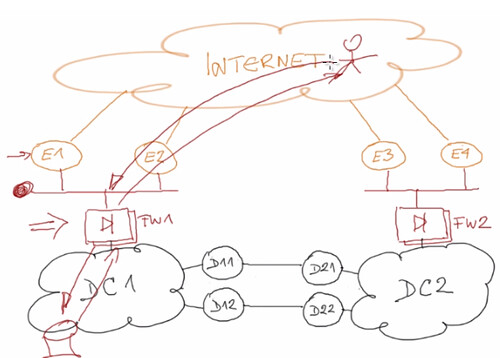 This is an interview with Gabriel Weinberg, founder of Duck Duck Go and general all around startup guru, on what DDG’s architecture looks like in 2012.
This is an interview with Gabriel Weinberg, founder of Duck Duck Go and general all around startup guru, on what DDG’s architecture looks like in 2012.
Innovative search engine upstart DuckDuckGo had 30 million searches in February 2012 and averages over 1 million searches a day. It’s being positioned by super investor Fred Wilson as a clean, private, impartial and fast search engine. After talking with Gabriel I like what Fred Wilson said earlier, it seems closer to the heart of the matter: We invested in DuckDuckGo for the Reddit, Hacker News anarchists.
Choosing DuckDuckGo can be thought of as not just a technical choice, but a vote for revolution. In an age when knowing your essence is not about about love or friendship, but about more effectively selling you to advertisers, DDG is positioning themselves as the do not track alternative, keepers of the privacy flame. You will still be monetized of course, but in a more civilized and anonymous way.
Pushing privacy is a good way to carve out a competitive niche against Google et al, as by definition they can never compete on privacy. I get that. But what I found most compelling is DDG’s strong vision of a crowdsourced network of plugins giving broader search coverage by tying an army of vertical data suppliers into their search framework. For example, there's a specialized Lego plugin for searching against a complete Lego database. Use the name of a spice in your search query, for example, and DDG will recognize it and may trigger a deeper search against a highly tuned recipe database. Many different plugins can be triggered on each search and it’s all handled in real-time.
Can’t searching the Open Web provide all this data? No really. This is structured data with semantics. Not an HTML page. You need a search engine that’s capable of categorizing, mapping, merging, filtering, prioritizing, searching, formatting, and disambiguating richer data sets and you can’t do that with a keyword search. You need the kind of smarts DDG has built into their search engine. One problem of course is now that data has become valuable many grown ups don’t want to share anymore.
Being ad supported puts DDG in a tricky position. Targeted ads are more lucrative, but ironically DDG’s do not track policies means they can’t gather targeting data. Yet that’s also a selling point for those interested in privacy. But as search is famously intent driven, DDG’s technology of categorizing queries and matching them against data sources is already a form of high value targeting.
It will be fascinating to see how these forces play out. But for now let’s see how DuckDuckGo implements their search engine magic...
Information Sources
Click to read more ...
 Monday, February 4, 2013 at 9:30AM
Monday, February 4, 2013 at 9:30AM 















 This is an interview with
This is an interview with 


